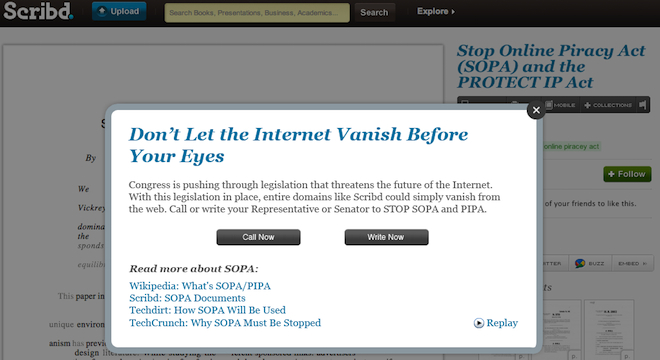Scribd is a four-year-old website that allows users to post, share and download documents in Word, PDF or text form. The site is phenomenally useful for journalism, and TPM has routinely relied on it to post a variety of documents.
But on Wednesday, we, and Scribd’s 75 million other monthly readers, were greeted by mysteriously disappearing text on documents we tried to read and an alarming message: “Congress is pushing through legislation that threatens the future of the Internet. With this legislation in place, entire domains like Scribd could simply vanish from the Web. Call or write your Representative or Senator to STOP SOPA and PIPA.”
Scribd pointed out in a separate release that “over a billion pages and nearly half a trillion words could simply disappear,” due to the legislation.
Indeed, Scridb had deliberately subverted its own technology to very publicly protest the two major pieces of anti-piracy legislation introduced to the House and Senate earlier this year, the Stop Online Piracy Act (SOPA) and the PROTECT-IP Act (PIPA), joining numerous other critics — among them a coalition of 70 Web companies and advocacy groups including Google, Facebook and Tumblr.
“Frankly, Scribd missed the first wave of tech companies jumping on the anti-SOPA bandwagon and we didn’t want to continue to sit on the sidelines,” said Scribd co-founder and Chief Technology Officer Jared Friedman, explaining his reasoning for the protest in an email to TPM.
Opposition to the bills has been steadily mounting since the House began holding hearings on the Stop Online Piracy Act in November, though it is unclear just how much effect that’s had on lawmakers’ proceedings.
Critics, including an increasing number of technical and legal experts, contend that the bills would “break the Internet” and erode free speech online.
Broadly speaking, SOPA and PIPA would give the attorney general the power to order American websites and companies to cut off all ties with foreign-based web addresses accused of piracy by copyright holders (Hollywood and the recording industry, principally), including links to those websites, advertising, and — in the case of internet service providers — even forcing them to refuse to serve up web pages to users when entered into the address bar.
But a breakthrough of sorts finally came for opponents of the legislation on Friday when House Judiciary Committee Chairman and SOPA-architect Rep. Lamar Smith (R-TX) finally relented in his quest to push the bill through as fast as possible, adjourning a contentious, ponderous 15-hour markup hearing until the next time the House is in session, in January 2012.
That said, with that breakthrough for SOPA opponents came another setback: Senate Majority Leader Harry Reid (D-NV) filed a cloture motion on Saturday to move the PROTECT-IP Act to the Senate floor for debate come Jan. 24, 2012.
In the meantime, Scribd wasn’t content to sit on its heels.
“We wanted to be join of the conversation in a meaningful way and when we learned that SOPA was headed back to the House floor this week,” Friedman told TPM. “Even though it has been delayed, we decided it was the right time to take a public stance.”
Scribd, like various other crowd-sourced, social websites that have lined up in opposition to SOPA — Reddit and Tumblr being two of the most high-profile — believes that SOPA and PIPA would threaten the very essence of its website: People freely posting content online for others to see.
That’s not say Scribd is in favor of piracy. The company routinely removes documents from its website on the requests of copyright holders under the already passed Digital Millennium Copyright Act, which became law in 1998.
As Friedman told TPM: “Scribd sets the highest bar for copyright protection by employing some of the best practices in the industry when it comes to copyright management. … In fact, we’ve heard from certain large publishers that their take-down notices have on Scribd have gone down by 95% or more in some cases.”
Friedman added: “Fortunately, under the DMCA, we’ve never had to take a copyright dispute to court. We’re concerned that this might no longer be true under SOPA.”
That’s why Friedman and the rest of the Scribd team don’t believe that any new legislation is necessary at this point. Still, they welcome the OPEN Act drafted by SOPA-opponents Rep. Darrell Issa (R-CA) and Sen. Ron Wyden (D-OR) as a viable alternative to the legislation currently going through the works in Washington. The OPEN Act is a crowdsourced document that has solicited comments and edits from the Web since it was published online Dec. 12.
Friedman said the Scribd team had been contacted by Rep. Issa’s office for its work and is working on other methods of fighting SOPA and PIPA.









